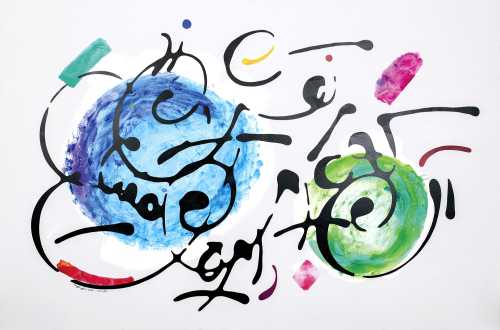About Ebrahim Haghighi
Ebrahim Haghighi, a graphic designer and photographer, was born in Tehran. Haghighi is one of the most innovative designers and one of the founders of the Graphic Designers Association. He studied architecture at the Faculty of Fine Arts at Tehran University between 1968 and 1972. During his student days, he turned to graphic design and benefited from the guidance of Morteza Momayez. He started his career in 1969 by designing posters for student theaters as well as book covers. At the invitation of Farshid Mesghali, he joined the group of designers at the Institute for the Intellectual Development of Children and Young Adults. After the revolution, he taught in different colleges. In 1987, he was active in organizing the first graphic design biennial. In 2001, he became a member of the International Graphic Union.
Haghighi often employs photomontage style and pictorial symbols in his designs and attempts to achieve a straightforward and restrained expression. In addition to cultural posters, book covers, and signs, he also did custom designing, and title sequencing. Designing and producing ten episodes of the TV series Little Ali is one of his other activities. This is a series that is one of the first examples of animated graphics in Iran. Haghighi has also tried photography and calligraphy and exhibited his works. Recently, in a collection of unconventional photos titled "Still Nature," he dealt with the theme of violence. Haghighi has also had experience of painting. Most of these works are composite landscapes executed using pastels on the surface of nature photos. Books such as "True Signs" (1995), "Theatre Poster" (2006), "Selected Works" (1385), and "The True Book" (1392) show the diversity of his design work. He has also worked in the theoretical field, and the book of repeated words (2012) is a selection of his writings. Examples of his works include the logo of the film magazine (1986), the poster of the Romeo and Juliet theater (2009), the cover of the art history book (Gambridge), the Sadegh Hedayat poster (2004), and the fourth celebration of the House of Theater (2007).
The Most Expensive Artwork
At Auctions
First Attendance
12 August 2021
# Attendance
2
# Artworks
2
Average Realized Price
4,484 USD
Average Min Estimate
2,804 USD
Average Max Estimate
3,739 USD
Sell-through Rate
100%
Average Growth of Artwork Worth
37.429%
Timeline
The 24th Tehran - Contemporary Iranian Art auction
3 October
The Flower Blooms, the New Spring Flourishes exhibition
2 May
Devil is in the Details exhibition
31 January
The Pioneers of Modern Iranian Art Vol.3 exhibition
24 August
Gargas exhibition
23 August
Darrous, 34 exhibition
2 August
Calligraphic Carpets exhibition
10 May
10s of Artworks, 10s of Millions exhibition
8 March
Printmaking Group Exhibition exhibition
19 August
Gloom exhibition
6 May
Opportunity exhibition
13 February
The 14th Tehran- Contemporary Iranian Art auction
12 August
Gathered exhibition
22 March
5th Collector exhibition
24 January
One tree in memory of Abbas Kiarostami exhibition
22 June
